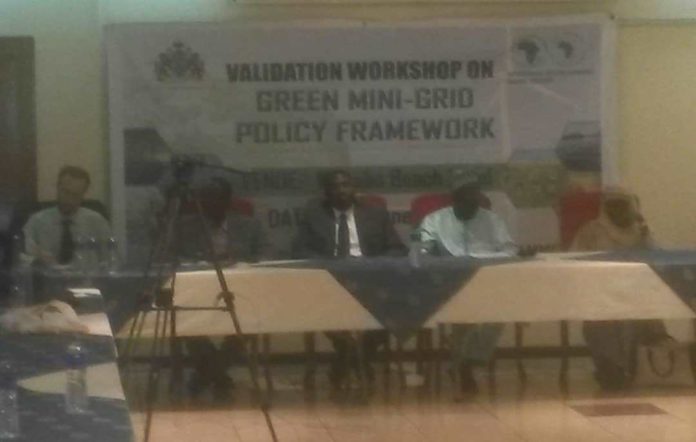By Madiba Singhateh
The Ministry of Petroleum and Energy on Wednesday June 12th 2019, held a validation workshop on the Gambia’s Green Mini-Grid Draft policy framework at a local Hotel in Senegambia, to increase the country electricity’s capacity usage.
Earlier this year, the Petroleum Ministry organised a validation on the development of the mini-grid which is renewable energy that the Gambia of the Government wants to implement in order to increase electricity capacity for the country, particularly for rural and peri-urban communities.
Speaking at the draft policy validation workshop, the Director of Public Utility Regulatory body PURA
Ansuma Sanneh, said the sector’s key role is to have a licensing framework put in place and to set a standard for its operation. ‘‘We are all aware that Gambia is a developing country and does not have total supply of electricity nationwide,’’ Sanneh said; that the convention system being used at present has to be supplemented for people to have access to electricity; that it is important for them as a country to have robot policies to be able to attract private sector investment.
Also speaking at the gathering was Lamin Camara, Permanent Secretary at the Ministry of Petroleum. Camara said the mini-grid draft policy validation workshop aims to make sure they have the opportunity to put forward their input and on how they want this to work. Camara urge everyone to contribute to the best of their ability towards the success of the document; that the validation workshop is to promote green-mini grid for universal access to the country’s electricity access which he said is currently below 50%. Camara said the validation intends to take electricity to those areas that are off the national power grid; that those people have the right to get electricity, because they are tax payers. He said this will increase the market capacity for suppliers which is important.
The Government of President Adama Barrow intends to provide electricity by the population by 2030 through the significant increment of share for renewable energy by up to 30% of the totally installed capacity.
Government also targets to electrify most rural and peri-urban areas using decentralized energy systems to stimulate productive activities through the Green Mini-grid renewable energy.




















